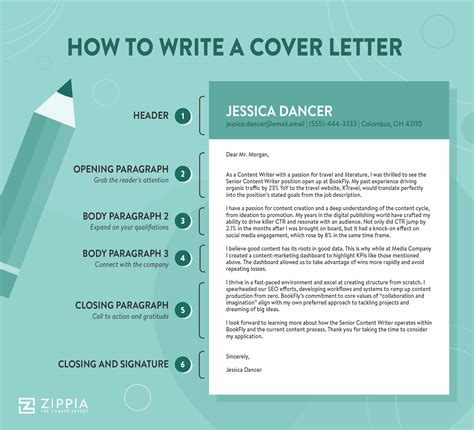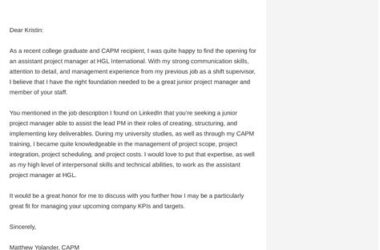Crafting the perfect nursing cover letter can often feel as daunting as a busy shift on the floor. Yet, with the right guidance, you can pen a compelling narrative that not only showcases your qualifications but also resonates with the heart of patient care. Whether you’re a seasoned veteran in the healthcare field or a fresh graduate with a passion for healing, your cover letter is a critical component of your application. In this guide, we’ll navigate through the essential elements of a standout nursing cover letter, from personalizing it to fit the ethos of the healthcare facility to ending with an impactful call to action that beckons hiring managers to take notice. Before you hit the “submit” button, we’ll also run through a final checklist to ensure your first impression is as meticulously cared for as your patients. Let’s begin the journey of creating a nursing cover letter that opens the doors to a rewarding career ahead.Craft a compelling nursing cover letter with our guide on essential elements, personalization tips, strong CTAs, and pre-submission checklist.
Identifying Key Elements to Include in Your Nursing Cover Letter
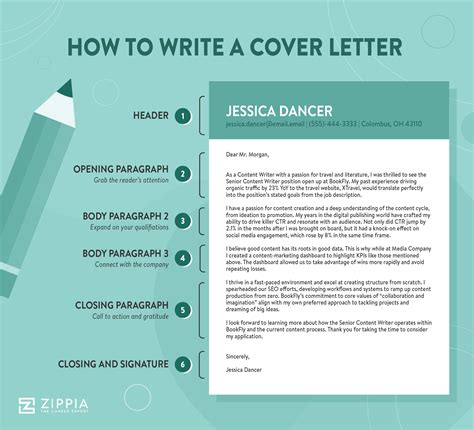
Creating a compelling nurse cover letter is a critical step in securing a nursing position. It’s essential to concisely convey your qualifications, experiences, and passion for nursing. A successful nurse cover letter effectively addresses the specific requirements of the role while highlighting your unique professional background. To stand out, your cover letter should reflect your understanding of the position and demonstrate how your skill set aligns with the needs of the healthcare facility.
To begin with, ensure that your nurse cover letter includes a clear introduction that states the position you are applying for, followed by a thoughtful explanation of why you are attracted to the opportunity and how your values align with the organization’s culture and mission. The body of your letter should illustrate your nursing expertise and experience with relevant examples, showing you are well-equipped to handle the responsibilities associated with the job. Finally, incorporating a personal touch by sharing a brief anecdote that portrays your dedication to patient care can make your application memorable. By meticulously addressing these key elements, your cover letter will present you as a well-rounded candidate, setting the stage for a strong application.
Tailoring Your Cover Letter to the Healthcare Facility
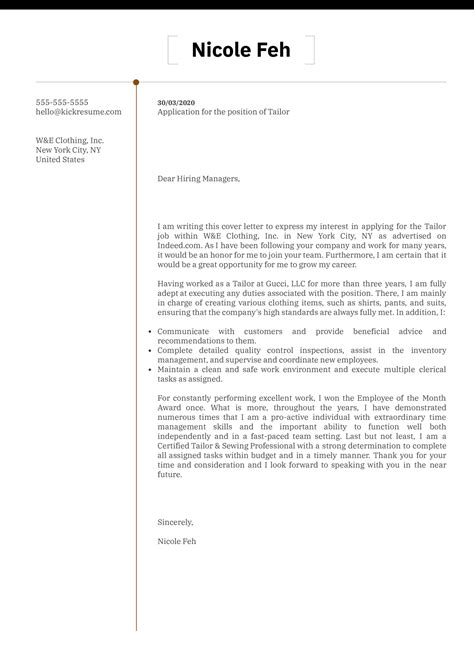
When embarking on the journey to create a compelling nurse cover letter, it’s crucial to align your qualifications and personal ethos with the specific needs and culture of the healthcare facility you’re applying to. Meticulously tailoring your cover letter not only demonstrates your interest in the position but also showcases your ability to pay attention to details and adapt to different environments, which are invaluable traits in the nursing profession. Long sentences allow for detailed explanations and the weaving of relevant experiences with the facility’s values and expectations.
To effectively tailor your letter, conduct thorough research on the potential employer. Find out the healthcare facility’s mission, values, patient population, and any special programs or services they offer. Doing so will enable you to address how your skills, experiences, and personal nursing philosophy align with their operations. Moreover, ensure that you reflect the key terminologies used in the job description that relate to your qualifications—this strategic incorporation of language not only resonates with the hiring manager but also helps in getting past automated applicant tracking systems. Remember, a personalized, well-researched nurse cover letter writing approach can significantly increase your chances of landing an interview and eventually, the position you desire.
Concluding Nurse Cover Letter With a Strong Call to Action
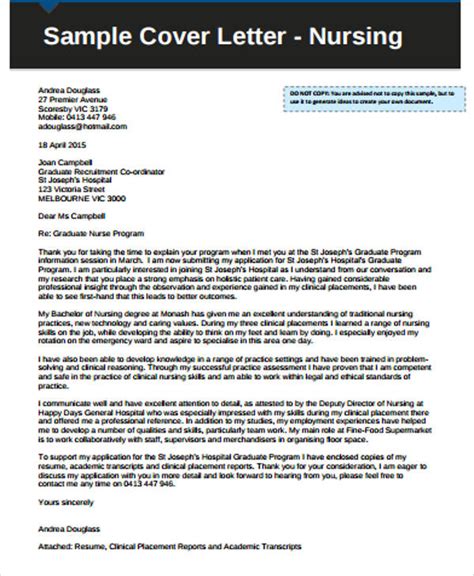
Concluding your nurse cover letter effectively is just as crucial as the opening statement. It is your final chance to make a strong impression and persuade the hiring manager to take the next step – inviting you for an interview. Your closing paragraph should reiterate your keen interest in the position and your belief that you are the ideal candidate for the job. However, this should not merely be a summary of your previous content; instead, a strategic and thoughtful approach must be used to forge a memorable closing argument.
To create that lasting effect, incorporating a strong call to action is essential. This could be a confident request for an interview or a statement indicating your intention to follow up within a certain period. Not only does this show your initiative, but it also sets the stage for further interaction. You might write, for example, I am very eager to discuss how my background in acute care nursing and passion for patient advocacy align with the goals of your team. I would welcome the opportunity for an interview and will follow up with you in a week’s time to hopefully discuss the possibilities. By doing so, you showcase both assertiveness and professionalism, key attributes for any nursing role.
Final Checklist Before Submitting Your Nursing Cover Letter
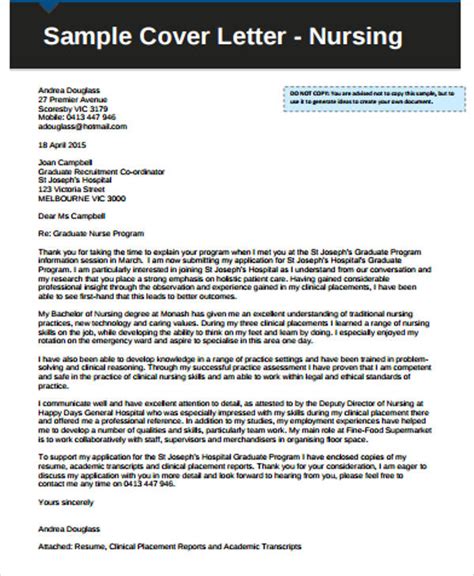
Once registered nurses have spent the time meticulously crafting their nurse cover letter, it’s crucial to run through a final checklist to ensure all key components are in place before hitting the ‘submit’ button. Not only does this final review underscore the importance of attention to detail—a trait highly valued in the healthcare industry—it also maximizes your potential to make a memorable impression on hiring managers. As you prepare to wrap up your nurse cover letter writing, tick off each item to certify that your cover letter is polished and ready to showcase your qualifications as a commendable candidate.
Starting at the top, confirm that your contact information is accurate and that the cover letter’s layout aligns with professional standards. Review the introduction and ensure it captivates the reader’s attention by clearly stating why you are a great fit for the role. Scrutinize the body of your cover letter, confirming that you’ve tailored your experiences and skills to the job description and the healthcare facility’s ethos. Moreover, ensure that you’ve narrated your points with compelling and long sentences that illustrate your proficiencies and compassionate nature. Lastly, the conclusion of your nurse cover letter should end with a robust call to action, inviting the reader to contact you and consider your application seriously. By adhering to this final checklist, your cover letter will stand as a testament to your professionalism and dedication as a healthcare professional.
Frequently Asked Questions
What is the purpose of a cover letter for a nursing job application?
The purpose of a cover letter for a nursing job application is to introduce yourself to the employer, highlight your relevant skills and experiences, explain why you are interested in the position, and provide a compelling reason why you would be an excellent fit for the role.
How should a nurse structure their cover letter?
A nurse’s cover letter should be structured with a professional salutation, an engaging opening paragraph, 1-2 body paragraphs detailing your nursing experience and suitability for the job, a closing paragraph that reiterates your interest in the role, and a formal sign-off.
Can you provide some tips for personalizing a nurse cover letter?
To personalize a cover letter, research the healthcare facility to understand its values and culture, address the letter to the correct hiring manager, mention specific aspects of the job that excite you, and relate your personal nursing philosophy or experiences directly to the employer’s needs.
What common mistakes should nurses avoid when writing their cover letters?
Nurses should avoid common mistakes such as using a generic template without customization, providing too much information or irrelevant details, neglecting to proofread for errors, and failing to express enthusiasm for the nursing profession or specific employer.
Is it important to mention specific nursing skills in my cover letter?
Yes, it is crucial to mention specific nursing skills in your cover letter to highlight your expertise and showcase how your skill set aligns with the job requirements. Emphasize both hard skills, like clinical competencies, and soft skills, such as communication and empathy.
How can a new graduate nurse make their cover letter stand out?
A new graduate nurse can make their cover letter stand out by emphasizing their clinical rotations and the specialized skills they acquired, detailing their dedication to the nursing profession, sharing any relevant volunteer experiences, and demonstrating enthusiasm to learn and grow within the role.
Should I explain employment gaps in my nursing cover letter?
Employment gaps can be briefly explained in a nursing cover letter if they are relevant to your current job application. If the gap was due to continuing education, family responsibilities, or a personal matter that has since been resolved, it can be addressed in a positive way that focuses on your readiness to return to work.



